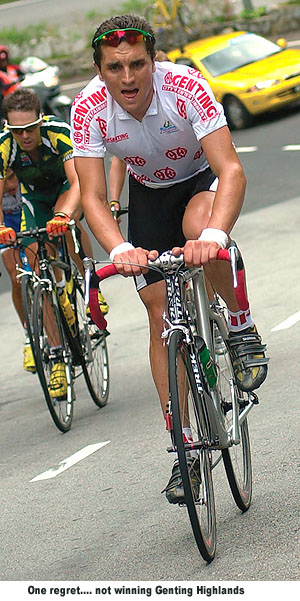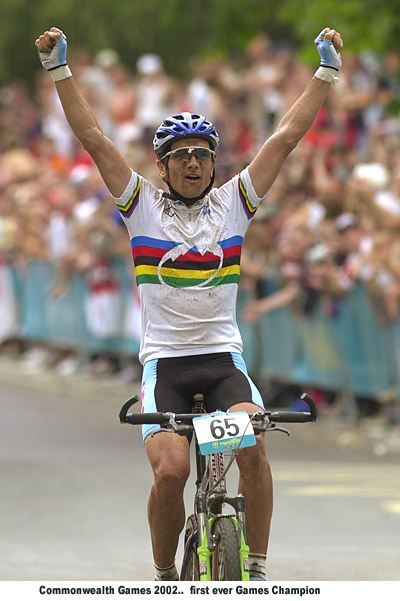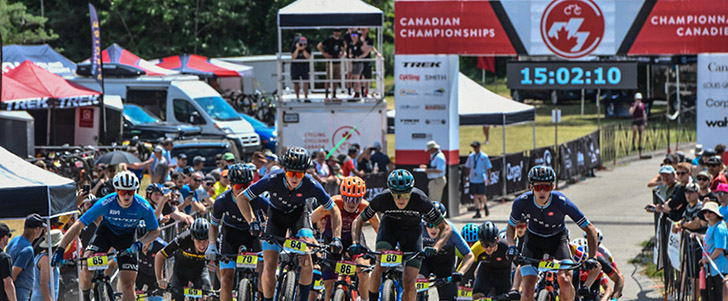October 19/05 8:21 am - Roland Green Retires
Posted by Editor on 10/19/05
| Roland Green Retires After 16 years of racing, Roland Green has confirmed that he has retired. We spoke with Roland earlier today from his home on Vancouver Island. Green is a two-time world champion, Commonwealth Games champion, World Cup champion, national champion and Norba champion in mountain biking. On the road he finished as high as 14th at the road world championships (time trial) and won the climber's jersey at the Tour de Langkawi. Canadian Cyclist: So, is it official - have you retired? Roland Green: Yes, I'm done. I haven't touched a bike in three weeks right now. CC: When did it happen? After you flatted at the Worlds? RG: It was a decision that was at the back of my mind the whole season, but the Worlds was the final decision-maker. I was hoping something big would happen there; that what it needed to keep me going another year. The Worlds were just the last 5% of the decision, something amazing would have had to happen to keep me riding. CC: After your problems in the last two seasons (crashes, illness, suspension), you seemed to be making progress back to the top. RG: Yeah, there was progression, but it wasn't enough. I was at the high level for a few years, and could maintain my form, but when I started to slide, no matter the training, it was very frustrating. When you are used to being in the top results, it's not the same to keep racing. I can't say that I didn't try - I spent a lot of time in California in the early season, I put in a lot of miles. I don't really know what it was; maybe as you get older the body doesn't have it anymore. The hardest thing was to go as hard as before and not get the results. CC: Wasn't it maybe mental, after the problems you had? RG: No, no it wasn't mental. When things don't go well I work harder. I really felt that I did my best, but it just wasn't clicking. CC: It must have been difficult to compete at the World Cup level when you didn't have the same sponsorship as in the past? RG: Not at all. Kona was a fantastic sponsor; it wasn't the same size team as a Trek, but they did a lot. I actually had a lot more fun this year than on any other team. Mountain biking's not at the same level as road when it comes to teams, so even on the biggest teams there's a lot more fending for yourself. CC: We were thinking that you might retire in the near future, but were wondering if you would hold on to defend your Commonwealth Games title. RG: Yeah, that was the hardest part; letting go of the Commonwealth Games. But, the other side is: what do you do once you have won? Can it really be satisfying to go and finish top-5 after winning? CC: Do you think the sport is changing as well? RG: Yeah, mountain biking is picking up more in Europe, but there is more endurance events, less focus on cross-country. I haven't done the endurance events, but it is not the direction I like to see the sport going; I think cross-country is the purest form of the sport. CC: What about going back to the road? There are a number of riders still performing well at your age and older? RG: I thought about it, but it's not going to happen. To do the road at the level that I would be satisfied with . . . I'm too old. I'm happy with what what I've done. Starting in 1999 I began to find good form, and then 2001, that was the best, everything clicked . . . those are good memories I will have forever. (Roland won the World and World Cup titles, national title, two Norba titles and was number 1 ranked in the world at the end of 2001) CC: Looking back at your results, what especially stands out? RG: Winning my first World Cup in Houffalize (2001) . . . Vail (2001 world championships) was the biggest . . . winning Mont Ste Anne (World Cup) that year too and winning the overall after missing three European races, that was really something. CC: How about regrets? RG: Not winning Genting Highlands (at Tour de Langkawi in 2003). I was too aggressive at the bottom of the climb, I screwed it up (Editor's Note - I was on a motorcycle all the way up the climb with Roland, Tom Danielson and Hernan Munoz. Roland was clearly the strongest rider in the race). The coaches always said that I was too heavy to climb, but my biggest wins always came from climbing. Ha! I showed you guys! (laughs) I think also the time trial at the Road Worlds; I would have really liked a top-10 there. The year I was 14th (2001 in Lisbon), I had no prep, I just jumped on the bike. And then the next year, 19th . . . twice there I feel like I could have done better. In mountain biking I have no regrets, I won everything but the Olympics. CC: You haven't mentioned the Olympics as a regret. RG: It's a huge title, but not necessarily the hardest to win. I have mixed feelings about the Olympics. I am happy to have experienced it in 2000, but the process of getting there, the selection, the spots, means that riders aren't at their best when they get there. CC: Now the tough question - doping. Cycling has been getting a lot of negative press lately about doping. What are your thoughts? RG: (Long pause) Cycling has always been a victim of drugs. The press will always focus on drugs in cycling, I think. Drugs are just as prevalent in other sports, but there is a lot more money involved in those sports, so they won't focus on it. Why cycling? There are a lot of great athletes, making next to no money. There are positive drug tests going back to Merckx and Hinault's times. Why don't you hear more about the (top) riders' positives? Money. In other sports, where the athletes get paid $10 million, they have the lawyers to fight for them, the system can't afford to have them go (get caught/sanctioned). The advantage just keeps passing to the riders with the most money. It is the small guys like Shep (Chris Sheppard) who get crucified. Shep, now his opinion (against doping) is worth more now than ever, but not in Canada - we have the attitude that everything is so pure and clean. So he can't assist anymore. The (current system), I see a lot of waste, a lot of money that could go other, better ways. The only thing that I have seen that is promising is the volunteer program, where athletes sign up and make their blood tests publicly available. If you could get more and more riders to participate, it might put more pressure on those that don't. Other than maybe that, I don't know what the answer is. CC: So, finally, what are you up to, now? RG: I've got a couple of properties that I'm working on, managing, and I'd like to do more of that. I'm helping a few athletes with cycling, nothing formal, but I'm getting a lot of satisfaction out of that. I'm not riding, into trail running right now, but I expect I will ride my bike again. Right now it feels good to stand up straight and have proper posture! |  |
 | |
 |
| Return to Canadian Cyclist homepage | Back to Top |





